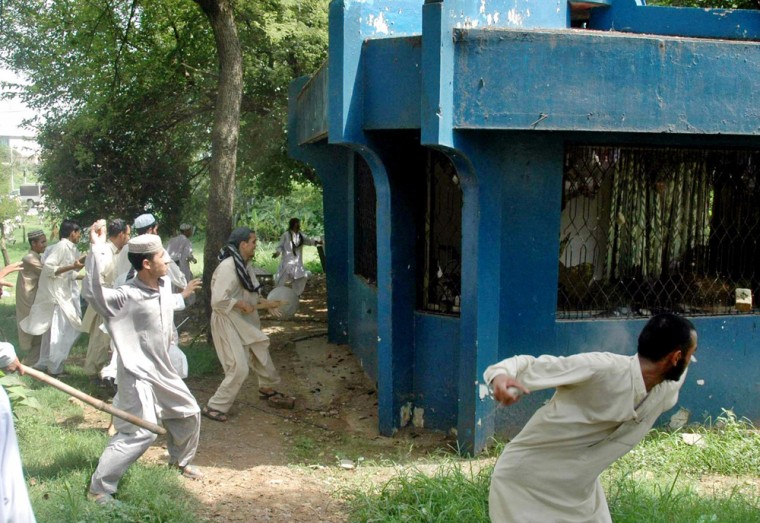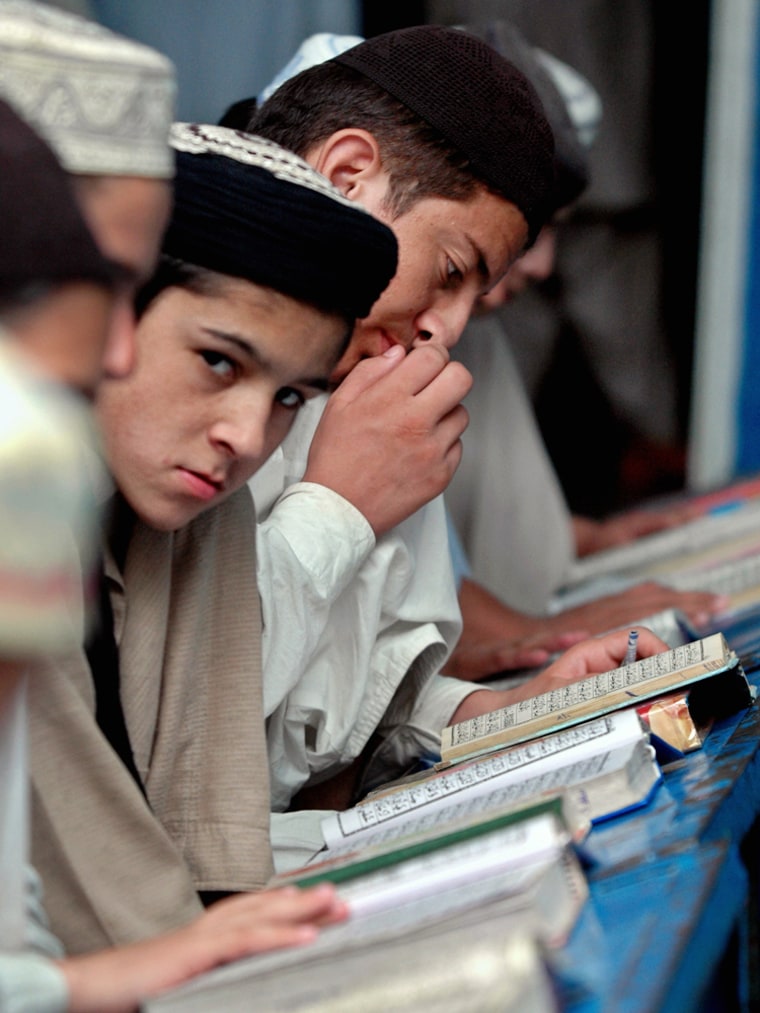In the wake of the London attacks, Pakistan’s madrassas, or religious schools, are back in the international spotlight, and the Pakistani government is under renewed pressure to reign in organizations that preach hatred and militancy.
Since the 9/11 attacks on New York and Washington, the United States has sought Pakistan’s cooperation in cracking down on madrassas that are ideologically, and sometimes militarily, aligned with Taliban and al-Qaida remnants in the region.
Now Britain, reeling from the July 7 terror attacks on the heart of London, is also piling pressure on Pakistan.
British Prime Minister Tony Blair, in a recent statement, condemned madrassa leaders who espouse extremist views and impart them to young students.
“These roots are deep,” Blair said at a recent Downing Street meeting with Afghan President Hamid Karzai. “They are coming about by people indoctrinated at a very, very early age … (who) go to some of these schools, these madrassas, and they get extreme teaching taught at them.”
Blair said the madrassa students “end up in a situation where they actually believe that they are committing the will of god by killing innocent people.”
London link?
The madrassa issue has boiled over again, largely because of reports that bomber Shehzad Tanweer visited a religious school in Lahore, in eastern Pakistan, that is linked to a banned Islamic militant group.
Officials at the madrassa say they have no record of Tanweer studying there. And if he did visit, it’s unclear how his stay influenced his decision or ability to detonate a bomb in London.
Blair and the U.S. administration have recognized the role of madrassas in Pakistan, where intensive religious training turns young men into Islamic scholars. The madrassas also provide basic education for tens of thousands of poor Pakistanis who might otherwise not find places in the government’s overloaded school system.
Western and Pakistani officials estimate there are anywhere from 12,000 to 15,000 madrassas in Pakistan, most of them legitimate, training about 1,000,000 students.
Blair said he had spoken recently to Pakistan's president, Gen. Pervez Musharraf, and was satisfied that there is a “real desire and willingness on part of Pakistan's government to deal with madrassas preaching this kind of extremism.”
But it’s a minority of madrassas that worry diplomats and intelligence officials.
Madrassas have also been used as shelters or meeting points for militants, bases for clandestine operations by Taliban and al-Qaida supporters, or training grounds for their soldiers. The banned militant group Lashkar-e-Taiba is believed to have links to the madrassa visited by Tanweer, intelligence sources say.
‘Respect’ for bin Laden
Little of the activities of the three July 7 British-born bombers of Pakistani descent —Tanweer, Mohammed Sidique Khan and Hasib Hussain — is known during their visits to Pakistan. Immigration records of Tanweer and Khan’s trips were released by the Pakistani government, and intelligence services are attempting to trace their travels inside the country.
Members of Tanweer’s extended family, contacted by NBC News, say that he stayed with them for a month in a small village in western Pakistan. A cousin, Ashfaq Ahmad, said Tanweer was “very religious” and had “great respect for Osama bin Laden.”
Though Ahmad said he couldn’t understand how his “quiet” cousin could have taken part in a bomb plot in London, he said Tanweer was deeply affected by what he saw as injustices toward Muslims.
“Whenever he would see news of Muslims being killed, he would tell us this was wrong,” Ahmad said.
An immigration record showing entry into Pakistan by Hasib Hussain has since been discredited and attributed to another man of the same name with no connection to the bombings. However, Hussain is believed to have relatives in the Kashmir region and, like many Britons of Pakistani descent, visited family over the years.
‘Bad name’ for Islam
Whether the influence of a madrassa on one of the bombers was religious or radical, the link between the attacks and Pakistan has put the country’s leadership on the defensive.
In a TV address to the nation, Musharraf announced a new initiative targeting madrassas with suspected links to militant groups.
“Those who are involved in extremism and terrorism won’t achieve anything except giving Islam a bad name,” Musharraf said.

But the president refused to let Pakistan take the blame for being a root cause of the hatred of second-generation Britons with Pakistani ancestry.
“We certainly have a problem here, which we are trying to address very strongly. But may I say that England also has a problem, which needs to be addressed," he said.
Religious leaders say the same, although they see the crackdown on Islamic groups — which have resulted in hundreds of arrests in the last week — as orchestrated by the West.
Wary of its image abroad, the Pakistani government has ordered madrassas to turn away foreign reporters. The views of Abdul Rasheed Ghazi, the head of one of the country’s largest madrassas, could be one reason why.
“Pervez Musharraf is a dictator, and we think he is an agent of the United States of America,” Ghazi said in an interview, when asked for his reaction to the government crackdown. “The reaction will be hatred — hatred for Tony Blair. Hatred for Bush.”
Targeting madrassas
Ghazi, who believes he might be detained by the police, defended the madrassa system as overwhelmingly legitimate. He said madrassas and the government had a common goal of closing down militant schools.
“The madrassa system is doing a better job (of educating) than the government.”
Musharraf appeared to agree in his televised address. Closing down schools will leave thousands with nowhere to go, he said.
Musharraf has reiterated an order for madrassas to register with the government by the end of the year, or face closure. Ghazi said registering was a reasonable request, but it will be followed by regulation by government officials.
“They are not sincere to help us. They just want to come in to interfere. That is not acceptable,” he said.
